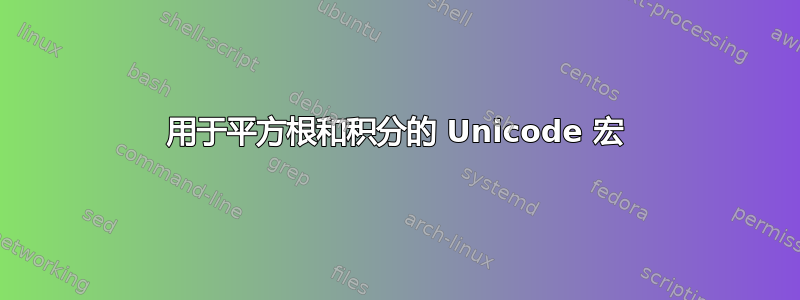
是否可以定义数学模式宏 √ 和 ∫,它们将按以下方式扩展:
√a ≡ \sqrt{a}
√{a + b} ≡ \sqrt{a + b}
∫ ≡ \int
∫_a ≡ \int\limits_a
∫^a ≡ \int\limits^a
∫_a^b ≡ \int\limits_a^b
?
答案1
很容易newunicodechar
\documentclass{article}
\usepackage[intlimits]{amsmath}
\usepackage{ifxetex}
\ifxetex
\usepackage{unicode-math}
\removelimits{\int}
\else
\usepackage[T1]{fontenc}
\usepackage[utf8]{inputenc}
\fi
\usepackage{newunicodechar}
\newunicodechar{√}{\sqrt}
\ifxetex\else
% these are already available with unicode-math
\newunicodechar{∫}{\int}
\newunicodechar{∞}{\infty}
\newunicodechar{π}{\pi}
\fi
\begin{document}
\[
∫_{-∞}^{∞}e^{-x^2}\,dx = √{π}
\]
\end{document}

∞请注意,和周围的括号π仅在使用时是必要的pdflatex,而不是使用 XeLaTeX。
以下是使用 Asana Math 的 XeLaTeX 示例:
\documentclass{article}
\usepackage{amsmath}
\usepackage{unicode-math}
\usepackage{newunicodechar}
\newunicodechar{√}{\sqrt}
\setmainfont{TeX Gyre Pagella}
\setmathfont{Asana Math}
\removenolimits{\int}
\begin{document}
\[
∫_{-∞}^∞ e^{-x^2}\,dx = √π
\]
\end{document}

答案2
以下是我想尝试使用的unicode数学宏:
\documentclass{article}
\usepackage{amsmath}
\usepackage{unicode-math}
\setmathfont{Asana Math}
\usepackage{newunicodechar}
% roots:
\newunicodechar{√}{\sqrt}
\newunicodechar{∛}{\sqrt[3]}
\newunicodechar{∜}{\sqrt[4]}
% full differential:
\newunicodechar{d}{\,\mathrm{d}}
% superscripts:
\newunicodechar{⁰}{^0}
\newunicodechar{¹}{^1}
\newunicodechar{²}{^2}
\newunicodechar{³}{^3}
\newunicodechar{⁴}{^4}
\newunicodechar{⁵}{^5}
\newunicodechar{⁶}{^6}
\newunicodechar{⁷}{^7}
\newunicodechar{⁸}{^8}
\newunicodechar{⁹}{^9}
% subscripts:
\newunicodechar{₀}{_0}
\newunicodechar{₁}{_1}
\newunicodechar{₂}{_2}
\newunicodechar{₃}{_3}
\newunicodechar{₄}{_4}
\newunicodechar{₅}{_5}
\newunicodechar{₆}{_6}
\newunicodechar{₇}{_7}
\newunicodechar{₈}{_8}
\newunicodechar{₉}{_9}
% use \limits by default:
\removenolimits{\int}
\removenolimits{\iint}
\removenolimits{\iiint}
\removenolimits{\oint}
\removenolimits{\oiint}
\removenolimits{\oiiint}
% left-rigth:
\newunicodechar{(}{\left (}
\newunicodechar{)}{\right )}
\newunicodechar{[}{\left [}
\newunicodechar{[}{\right ]}
\newunicodechar{{}{\left \lbrace}
\newunicodechar{}}{\right \rbrace}
\newunicodechar{<}{\left \langle}
\newunicodechar{>}{\right \rangle}
\begin{document}
$√a ~~ √{a + b}$
$dx ~~ dx$
$x¹ ~~ x₁$
$∫_0^1$
$(\frac{1}{2})$
\begin{equation}
∫_0^1
\end{equation}
\end{document}
给出:

在 emacs 中可以轻松输入 unicode 符号。我已将以下内容添加到~/.emacs:
;; roots:
(define-key 'iso-transl-ctl-x-8-map (kbd "C-S-s") [?√])
(define-key 'iso-transl-ctl-x-8-map (kbd "C-3 C-S-s") [?∛])
(define-key 'iso-transl-ctl-x-8-map (kbd "C-4 C-S-s") [?∜])
;; integrals:
(define-key 'iso-transl-ctl-x-8-map (kbd "C-S-i") [?∫])
(define-key 'iso-transl-ctl-x-8-map (kbd "C-2 C-S-i") [?∬])
(define-key 'iso-transl-ctl-x-8-map (kbd "C-3 C-S-i") [?∭])
(define-key 'iso-transl-ctl-x-8-map (kbd "C-S-c") [?∮])
(define-key 'iso-transl-ctl-x-8-map (kbd "C-2 C-S-c") [?∯])
(define-key 'iso-transl-ctl-x-8-map (kbd "C-3 C-S-c") [?∰])
(define-key 'iso-transl-ctl-x-8-map (kbd "C-S-d") [?d])
;; left-right:
(define-key 'iso-transl-ctl-x-8-map (kbd "(") [?(])
(define-key 'iso-transl-ctl-x-8-map (kbd ")") [?)])
(define-key 'iso-transl-ctl-x-8-map (kbd "[") [?[])
(define-key 'iso-transl-ctl-x-8-map (kbd "]") [?]])
(define-key 'iso-transl-ctl-x-8-map (kbd "{") [?{])
(define-key 'iso-transl-ctl-x-8-map (kbd "}") [?}])
(define-key 'iso-transl-ctl-x-8-map (kbd "<") [?<])
(define-key 'iso-transl-ctl-x-8-map (kbd ">") [?>])
(define-key 'iso-transl-ctl-x-8-map (kbd "!") [?¹]) ;; S-1
(define-key 'iso-transl-ctl-x-8-map (kbd "@") [?²]) ;; S-2
(define-key 'iso-transl-ctl-x-8-map (kbd "#") [?³]) ;; S-3
(define-key 'iso-transl-ctl-x-8-map (kbd "$") [?⁴]) ;; S-4
(define-key 'iso-transl-ctl-x-8-map (kbd "%") [?⁵]) ;; S-5
(define-key 'iso-transl-ctl-x-8-map (kbd "^") [?⁶]) ;; S-6
(define-key 'iso-transl-ctl-x-8-map (kbd "&") [?⁷]) ;; S-7
(define-key 'iso-transl-ctl-x-8-map (kbd "*") [?⁸]) ;; S-8
(define-key 'iso-transl-ctl-x-8-map (kbd "C-9") [?⁹]) ;; S-C-9
(define-key 'iso-transl-ctl-x-8-map (kbd "C-0") [?⁰]) ;; S-C-0
(define-key 'iso-transl-ctl-x-8-map (kbd "M-1") [?₁])
(define-key 'iso-transl-ctl-x-8-map (kbd "M-2") [?₂])
(define-key 'iso-transl-ctl-x-8-map (kbd "M-3") [?₃])
(define-key 'iso-transl-ctl-x-8-map (kbd "M-4") [?₄])
(define-key 'iso-transl-ctl-x-8-map (kbd "M-5") [?₅])
(define-key 'iso-transl-ctl-x-8-map (kbd "M-6") [?₆])
(define-key 'iso-transl-ctl-x-8-map (kbd "M-7") [?₇])
(define-key 'iso-transl-ctl-x-8-map (kbd "M-8") [?₈])
(define-key 'iso-transl-ctl-x-8-map (kbd "M-9") [?₉])
(define-key 'iso-transl-ctl-x-8-map (kbd "M-0") [?₀])
这是一个 emacs defun,它将缓冲区或行区域转换为 unicode 数学宏,并使用C--— 将其转换回来:
(defun tex-unicode-maths ()
"Converts equation to unidoce math. With C-- un-unicodes it back.
Acts on buffer or region of lines."
(interactive)
(save-excursion
(save-restriction
(let ( start end pairs
(common-pairs '(
("\\\\sqrt" "√")
("\\\\sqrt[3]" "∛")
("\\\\sqrt[4]" "∜")
("_0" "₀")
("_1" "₁")
("_2" "₂")
("_3" "₃")
("_4" "₄")
("_5" "₅")
("_6" "₆")
("_7" "₇")
("_8" "₈")
("_9" "₉")
))
(unicode-pairs '(
("\\^0" "⁰")
("\\^1" "¹")
("\\^2" "²")
("\\^3" "³")
("\\^4" "⁴")
("\\^5" "⁵")
("\\^6" "⁶")
("\\^7" "⁷")
("\\^8" "⁸")
("\\^9" "⁹")
("\\\\,[[:blank:]]*\\\\mathrm{d}" "d")
("\\\\left[[:blank:]]*(" "(")
("\\\\right[[:blank:]]*)" ")")
("\\\\left[[:blank:]]*\\[" "[")
("\\\\right[[:blank:]]*\\]" "]")
("\\\\left[[:blank:]]*\\\\lbrace" "{")
("\\\\right[[:blank:]]*\\\\rbrace" "}")
("\\\\left[[:blank:]]*\\\\langle" "<")
("\\\\right[[:blank:]]*\\\\rangle" ">")
))
(un-unicode-pairs '(
("^0" "⁰")
("^1" "¹")
("^2" "²")
("^3" "³")
("^4" "⁴")
("^5" "⁵")
("^6" "⁶")
("^7" "⁷")
("^8" "⁸")
("^9" "⁹")
("\\\\,\\\\mathrm{d}" "d")
("\\\\left (" "(")
("\\\\right )" ")")
("\\\\left \\[" "[")
("\\\\right \\]" "]")
("\\\\left \\\\lbrace" "{")
("\\\\right \\\\rbrace" "}")
("\\\\left \\\\langle" "<")
("\\\\right \\\\rangle" ">")
))
(case-fold-search nil)
)
(if (use-region-p)
(progn (setq start (region-beginning)) ;; then
(setq end (region-end))
(goto-char start)
(setq start (line-beginning-position))
(goto-char end)
(setq end (line-end-position)))
(progn (setq start (point-min)) ;; else
(setq end (point-max))))
(narrow-to-region start end)
;; despite we have a single argument here the cond strutcture
;; is used since it allows for easy extension for more args:
(cond
((equal current-prefix-arg '-)
(setq pairs (append common-pairs un-unicode-pairs))
(mapc
(lambda (currentPair)
(goto-char (point-min))
(while (search-forward-regexp (elt currentPair 1) nil t)
(replace-match (elt currentPair 0) t nil)))
pairs)
)
(t
(setq pairs (append common-pairs unicode-pairs))
(mapc
(lambda (currentPair)
(goto-char (point-min))
(while (search-forward-regexp (elt currentPair 0) nil t)
(replace-match (elt currentPair 1) t nil)))
pairs)
)
)
))))
工作原理如下:



